We’ve now been in Pemba for one month. As I think back over that time, I wonder what you, friends and family who are kind enough to read my blog, might want to know about life here so far. I think about some of the questions people have asked us. I think about the way we’ve spent our time and the people we’ve met. I think about the city and what makes it unique. I think about our house and how we’ve been getting settled in here. I think about our kids and the process of getting them in school. So here's the lowdown on month one of Pemba life for the Sparkses.
Pemba is special. As we've been settling in, it's been fun to explore this charming city. Some facts about Pemba: It’s a city of 200,000 people. It is the capital of Cabo Delgado province, the northeastern-most province in Mozambique. It is home to beautiful beaches and coral reefs and therefore has several high-end hotels and resorts, as well as good restaurants that cater to tourists and expatriates. There’s even a cute little coffee shop and bakery right down the street from our house. However, it is still a third-world city, with heaps of garbage scattered along the bumpy, pothole-ridden roads; vast neighborhoods of mud huts; and plenty of traditional outdoor markets where you can buy fruits and vegetables, fish, clothing, dishes, tools, etc.
 |
| View of the bay from the Immigration Office |
 |
The road in front of the Immigration Office
(if you look at the road closely, you'll see how bad it is) |
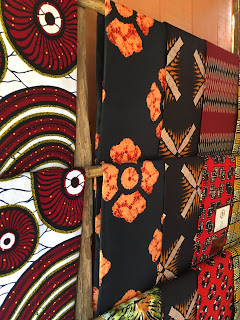 |
| Capulana fabric for sale at a local market |
 |
| The kids passing time outside the school uniform shop |
 |
| Shrimp ravioli at a local Italian restaurant |
 |
| Lobster at the Pemba Dolphin, a beachside restaurant |
There is one Baptist church and one Baptist mission (church plant but not yet considered a church by the Baptist Convention of Mozambique). The mission, called Fazenda, is in our neighborhood, so that’s where we will normally go.
 |
At the main church, Gracie and Judah with the pastor's son and
their teacher, Susan, reciting their key verse from Sunday School (they do this each week) |
 |
| The main church's 23rd anniversary celebration |
 |
| Harvey preaching at the Fazenda mission |
 |
Harvey attending the civil ceremony for the marriage
of the leader of the Fazenda mission |
 |
| Baptisms at the beach |
There is so much more to learn about the city, and over the next few weeks Harvey, along with the pastor of the Baptist church, will be mapping it out, figuring out where different segments of people live and congregate, where there are churches and other spiritual centers, and where there is lostness and need. All this will help us determine the strategies we need to use to reach Pemba with the Gospel, make disciples, and plant and strengthen churches.
We’ve got new friends (already!). We were told that Pemba had a lot of missionaries. It’s true. And we’ve already connected with many of them as a result of their kindness and hospitality. Through Facebook, I connected with a few of them before we even arrived here. And then after the move, those few connected us with others. We now attend an English Bible Study on Sunday evenings with around fifteen other believers and missionaries who live in Pemba and speak English. They come from, among other places, America, Canada, South Africa, Brazil, New Zealand, Finland, and Mozambique. Two families we’ve met have children the same age as ours, and we’ve already had play dates and meals with them. I’ve also gone shopping and out for coffee with new friends.
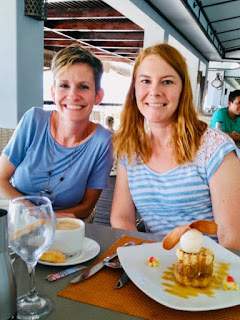 |
Coffee and dessert with Adrienne, an American friend
and fellow missionary who's now back in the U.S. for furlough |
You might be wondering what kind of work these other missionaries and expats do. One has a ministry to widows (The Widow's Might), teaching them to sew to support themselves and their families. Another has a ministry to exploited and abused women (The Liberty Project Africa), helping them heal, discipling them, and teaching them sewing, baking, and hospitality, and she’s planning to open a café soon. One is a doctor who works with the Leprosy Mission. Others are missionaries with Africa Inland Mission (AIM) and Assemblies of God. (I think the reason that so many choose Pemba as their base is that it’s a livable city and a good access point to the far northern parts of the country. It has an airport and many hotels and amenities (as I described above).) So making friends has been easy and fun, and we look forward to going deeper in these relationships.
 |
| View of the beach from a friend's backyard during a barbecue she hosted |
We pray now that God would help us make friends with more Mozambicans, including brothers and sisters in our church. They are kind but not quite as open, and we haven’t experienced them initiating conversations and friendships—it seems that this will fall more on us.
Our house is a sweet home. Much of our time over the past few weeks has been spent unpacking and setting up our house (which we lovingly refer to as "The Pink House").
 |
| Our driveways and front gate |
 |
| The driveway/side porch |
 |
| Harvey preparing the grill in the back yard |
 |
Grilling at sunset. The tower holds one water tank; a cistern sits underneath.
We hang our laundry on lines to dry.
The building on the left is our guest quarters (described below). |
 |
| Glorious grass! |
It is a new house (a first for us!), built in 2017 but empty until now, and it did not come furnished. In Nacala, since we were there only temporarily (for language), our mission provided furniture and the other necessities for our home. But once we moved to our place of assignment, we were responsible for providing all of those things for ourselves. The week after we arrived, we received a crate that we had packed more than a year ago, before we left DC, which held some of our instruments, a lot of kitchen items, and some home decor and clothing.
 |
| We were so excited to see the delivery truck! |
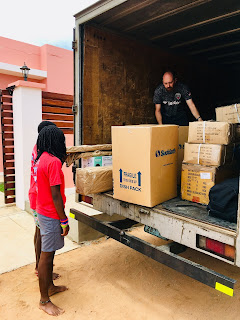 |
| Unloading the treasure |
 |
| Like unwrapping Christmas presents |
 |
| There's been more music in the house since the crate arrived! |
But we did not crate any furniture. That means we had to either buy furniture or have it made here—everything. (Thankfully, the Mission Board provided us with a generous outfitting allowance to set up our home, which has helped greatly—this is one of the many blessings that results from the faithful giving of Southern Baptists and others to the Cooperative Program and the International Mission Board, so thank you!)
So little by little, that’s what we’ve been doing. The first things we ordered were beds for the kids. The three girls are in one room, so Gracie and Judah share a bunk bed, and Tabitha has a twin bed. Ben and Asher share a room and each have a twin bed. We actually found the carpenter for the beds by the side of the road, where Harvey had seen a bunk bed that he had made and we liked it.
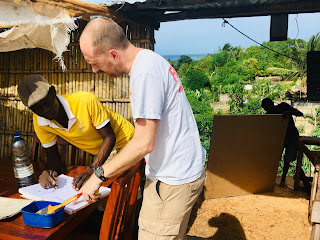 |
| Harvey ordering furniture from a local carpenter |
Next we used a carpenter who was recommended to us to build our couches and bookshelves. Since then he has also built our dining room table and chairs, coffee table, side table, and kitchen stools. Harvey just orders a couple of pieces at a time, and when he finishes those, Harvey orders a couple more. Right now we are lacking only our bed, a desk or two, and a media cabinet for the living room.
We’ve also had curtains made and bought bed sheets at local markets. It’s not easy to find affordable sheet sets here—that is one thing I wish we had put in the crate. Fitted sheets are rare.
So our house has three bedrooms, a small office, a good-sized kitchen, closets, and three and a half baths (one in each bedroom plus a half off the dining room). It also has a separate guest quarters in back with two bedrooms and two bathrooms. The guest quarters is one of the reasons we preferred this house over some of the other ones we saw. This was the only one that had an existing place to host guests. And we’ve already used it—twice! (Of course we had to have beds made and buy bedding and linens for those rooms as well.)
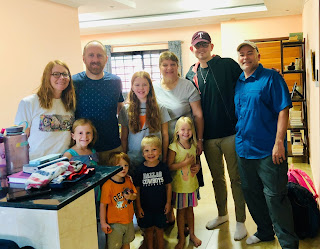 |
A volunteer team that came to work with our colleagues
spent a night with us in Pemba before heading up north. |
The house is in a neighborhood that’s developed over the past five to ten years, but it’s convenient to the places we frequent: shopping, church, and the beach. It’s about a ten-minute drive to the kids’ school.
There are a couple of downsides to the house, though we consider them minor. It has a small yard (albeit with grass, instead of sand, yay!), and the road to get to our house is horrible. It’s a dirt road with tons of potholes. But don't let that keep you away—come visit us and see the Pink House for yourself!
We couldn't do this without you (and your prayers). We truly believe that the reason things have gone so well for us over the past year and through this transition is prayer. We know that we have hundreds of faithful friends and supporters regularly lifting us up in prayer, and God is answering. As a family we are reading through the Psalms right now, and over and over we see the themes of crying out to God in prayer; God hearing and answering prayer; and God’s steadfast love, mercy, and faithfulness.
So thank you for your prayers, and please continue. Pray for our health, our kids, our ministry, our team, and our church. Pray for the lost in Pemba. Pray for our family back in America. Pray that God would continue to sustain us here, that we would be obedient, and that he would use us to accomplish His will.
Have I answered all of your questions about life for our family in Pemba? What else do you want to know? Please let me know in the comments here or on Facebook. I can't wait to share more in the coming weeks and months ... stay tuned!




































Comments
Post a Comment